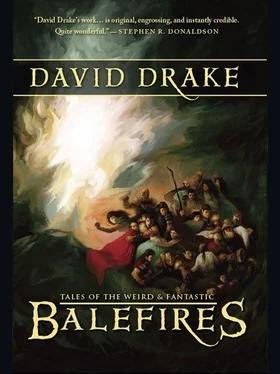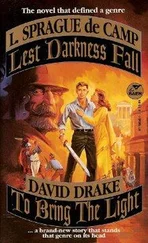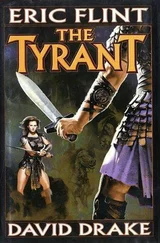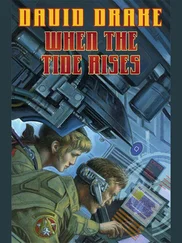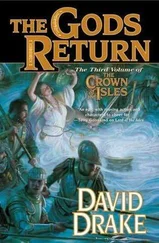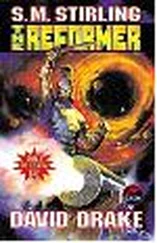David Drake - Balefires
Здесь есть возможность читать онлайн «David Drake - Balefires» весь текст электронной книги совершенно бесплатно (целиком полную версию без сокращений). В некоторых случаях можно слушать аудио, скачать через торрент в формате fb2 и присутствует краткое содержание. Жанр: Фантастика и фэнтези, на английском языке. Описание произведения, (предисловие) а так же отзывы посетителей доступны на портале библиотеки ЛибКат.
- Название:Balefires
- Автор:
- Жанр:
- Год:неизвестен
- ISBN:нет данных
- Рейтинг книги:5 / 5. Голосов: 1
-
Избранное:Добавить в избранное
- Отзывы:
-
Ваша оценка:
- 100
- 1
- 2
- 3
- 4
- 5
Balefires: краткое содержание, описание и аннотация
Предлагаем к чтению аннотацию, описание, краткое содержание или предисловие (зависит от того, что написал сам автор книги «Balefires»). Если вы не нашли необходимую информацию о книге — напишите в комментариях, мы постараемся отыскать её.
Balefires — читать онлайн бесплатно полную книгу (весь текст) целиком
Ниже представлен текст книги, разбитый по страницам. Система сохранения места последней прочитанной страницы, позволяет с удобством читать онлайн бесплатно книгу «Balefires», без необходимости каждый раз заново искать на чём Вы остановились. Поставьте закладку, и сможете в любой момент перейти на страницу, на которой закончили чтение.
Интервал:
Закладка:
Children Of The Forest
Many years ago I mentioned that I was a Fortean to a careful reporter who was taping the interview. My several psychiatrist friends were hugely amused when the printed version stated that I was a Freudian. Since then I've been careful to give an explanation of what I mean by the word.
Charles Fort collected reports of anomalous events from periodicals (largely from scientific journals) and published them in four volumes from 1919 to 1932. These include reports of things which are now accepted as true (for instance, giant squid and ball lightning) but which orthodox science at the time rejected as observer errors; matters which are unexplained but aren't especially controversial (for instance, unconfirmed sightings of astronomical bodies by respectable observers); and utterly bizarre things like a rain of frogs in England or a rain of shaved meat in Kentucky. Fort didn't write about UFOs, but they're part of modern Fortean interests.
Now-the fact that I'm interested in such things doesn't mean I believe in all of them. There are people who do, just as there are people who believe that disproving a report of spontaneous human combustion disproves all such reports. I consider both groups delusional (and I consider people who think you get real science or real history from a TV show to be deeply ignorant, but that's a slightly different matter).
One of the most entertaining writers on Forteana (and on natural history generally) was
Ivan T. Sanderson. He was capable of modifying his data to improve a story, but he was a fine writer and a man of great culture and intelligence.
One of Sanderson's essays was on wudewasas, woodhouses (yes, that's what the name of the humorist P.G. Wodehouse comes from): the drawings of wild men found in the margins of medieval manuscripts. He speculated that there'd been a European version of the Sasquatch, but that it was man-sized rather than a giant like the wild man of the Northwest United States.
The likelihood that this is true (or for that matter, the likelihood that Bigfoot is running around Northern California) didn't matter for my purposes. I thought the notion would work for a story, so I wrote "Children of the Forest."
The form goes back to the fairy tales which I loved of mine even I could read. It's become fashionable to give fairy tales a modern slant or to twist them. I wasn't trying to be clever, but I did try to treat the realities of medieval life and its class structure with the same sort of realism that I'd bring to a story set in Viet Nam.
When "Children…" was first published in F amp;SF, it brought me two angry letters. (Only one other story of mine from the '70s aroused any comment at all.) I'm not sure what that means, as the letter writers were incensed about completely different aspects of the story (and both were wrong). It may simply indicate that when I'm on, my fiction arouses an emotional reaction in readers.
If so, well, that's what I'm trying to do.
When Teller came in from the field, gnarled as his hoe-handle and looking twice his forty years, his wife said, "The cow has gone dry, man." Teller scowled. She had slapped out her words like bolts from a crossbow. He understood them, understood also why she was whetting the black iron blade of their only knife. From his wife, warped and time-blackened by the same years that had destroyed him, Teller turned to his daughter Lena.
And Lena was a dazzle of sunlight in the darkened hut.
She was six, though neither of her parents could have told a stranger that without an interval of mumbling and dabbing fingers to cracked lips. But there were no strangers. In the dozen years since the Black Death had swept southern Germany, the track that once led to the high road and thence to Stuttgart had merged back into the Forest. The hut was all of civilization, a beehive with two openings in its thatch. Teller now stooped in the doorway; above him was the roof hole that served as chimney for the open fire in the center of the room. By that fire sat Lena, easing another baulk of wood under the porridge pot before looking at her father. Her smile was timid, but the joy underlying it was as real as the blond of her sooty hair. She dared not show Teller the welts beneath her shift, but she knew that her mother would not beat her in his presence.
"I said, the cow has gone dry," the woman repeated.
The rasp of iron on stone echoed her words."You know we can't go on until the harvest with three mouths and no milk."
"Woman, I'll butcher-"
"You will not." She slid to the floor and faced him, bandy-legged and shorter on her own legs than when sitting on the stool."The meat will rot in a month, we have no salt. Three mouths will not last the summer on the cow's meat, man.
"Three mouths will not last the summer."
She was an iron woman, black-faced and blackhearted. She did not look at Lena, who cowered as her mother stepped forward and held out the wood-hafted knife to Teller. He took it, his eyes as blank as the pit of his mouth opening and closing in his beard. "Perhaps… I can hunt more…?"
"Hoo, coward!"mocked the woman."You're afraid to leave the clearing now for the woods devils, afraid to go out the door to piss in the night!" The reek of the wall across from the pine-straw bedding proved her statement. "You'll not go hunting, man."
"But-"
"Kill her. Kill her! " she shrieked, and Lena's clear voice wailed hopelessly as a background to the raucous cries. Teller stared at the weapon as though it were a viper which had crawled into his hand in the night. He flung it from him in a fury of despair, not hearing it clack against the whetstone or theping! of the blade as it parted.
The woman's brief silence was as complete as if the knife had pierced her heart instead of shattering. She picked up the longest shard, a hand's breadth of iron whose edge still oozed light, and cradled it in her palms. Her voice crooned without meaning, while Teller watched and Lena burrowed her face into the pine needles.
"We can't all three eat and live to the harvest, man," the woman said calmly. And Teller knew that she was right.
"Lena," he said, not looking at the girl but instead at his cloak crumpled on the earthen floor. It was steerhide, worn patchily hairless during the years since he had bartered eggs for it from a passing peddler. That one had been the last of the peddlers, nor were there chickens anymore since the woods demons had become bolder.
"Child," he said again, a little louder but with only kindness in his voice. He lifted the cloak with his left hand, stroked his daughter between the shoulder blades with his right. "Come, we must go for a little journey, you and I."
The woman backed against the hut wall again. Her eyes and the knife edge had the same hard glitter.
Lena raised her face to her father's knee; his arm, strong for all its stringiness, lifted her against his chest. The cloak enveloped her and she thrashed her head free. "I'm hot, Papa."
"No, we'll play a game," Teller said. He hawked and spat cracklingly on the fire before he could continue. "You won't look at the way we go, you'll hide your head. All right, little one?"
"Yes, Papa." Her curls, smooth as gold smeared with river mud, bobbled as she obediently faced his chest and let him draw the leather about her again.
"The bow, woman," Teller said. Silently she turned and handed it to him: a short, springy product of his own craftsmanship. With it were the three remaining arrows, straight-shafted with iron heads, but with only tufts remaining of the fletching. His jaw muscles began to work in fury. He thrust the bow back to her, knots of anger dimpling the surface of his bare left arm. "String it! String it, you bitch, or-"
She stepped away from his rage and quickly obeyed him, tensing the cord without difficulty. The wood was too supple to make a good bow, but a stiffer bowshaft would have snapped the bark string. Teller strode from the hut, not deigning to speak again to his wife.
Читать дальшеИнтервал:
Закладка:
Похожие книги на «Balefires»
Представляем Вашему вниманию похожие книги на «Balefires» списком для выбора. Мы отобрали схожую по названию и смыслу литературу в надежде предоставить читателям больше вариантов отыскать новые, интересные, ещё непрочитанные произведения.
Обсуждение, отзывы о книге «Balefires» и просто собственные мнения читателей. Оставьте ваши комментарии, напишите, что Вы думаете о произведении, его смысле или главных героях. Укажите что конкретно понравилось, а что нет, и почему Вы так считаете.
